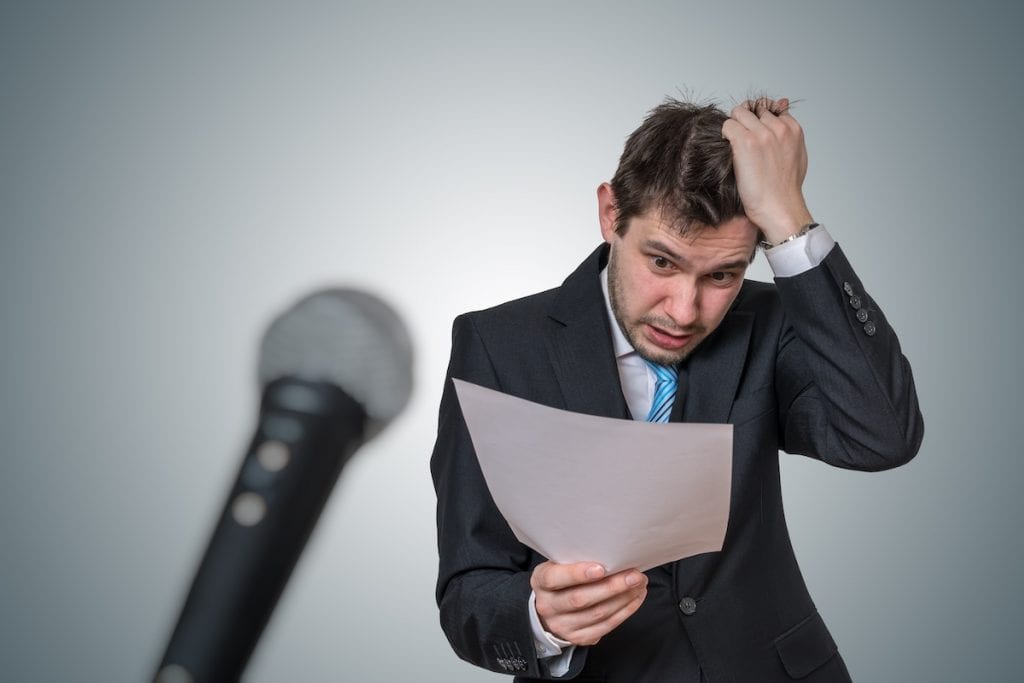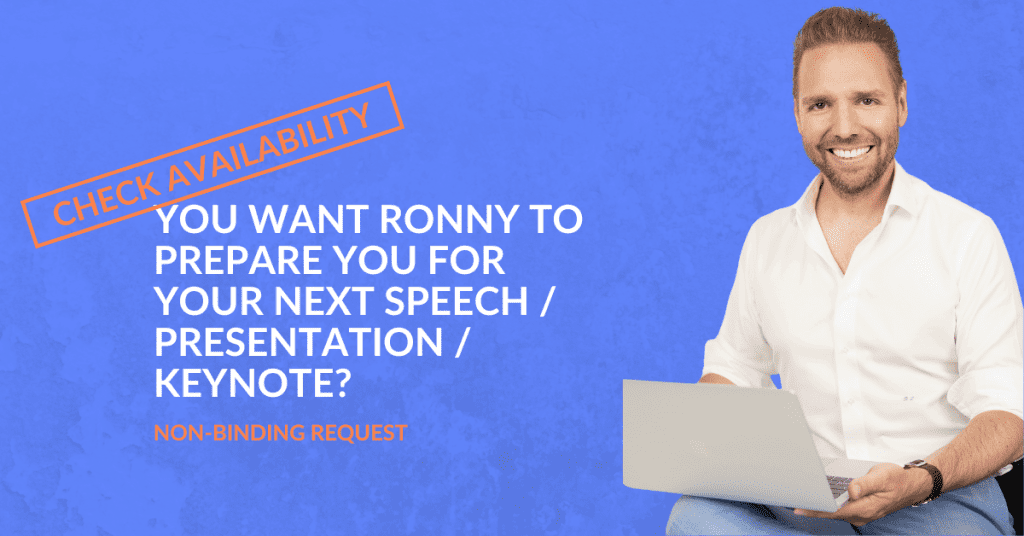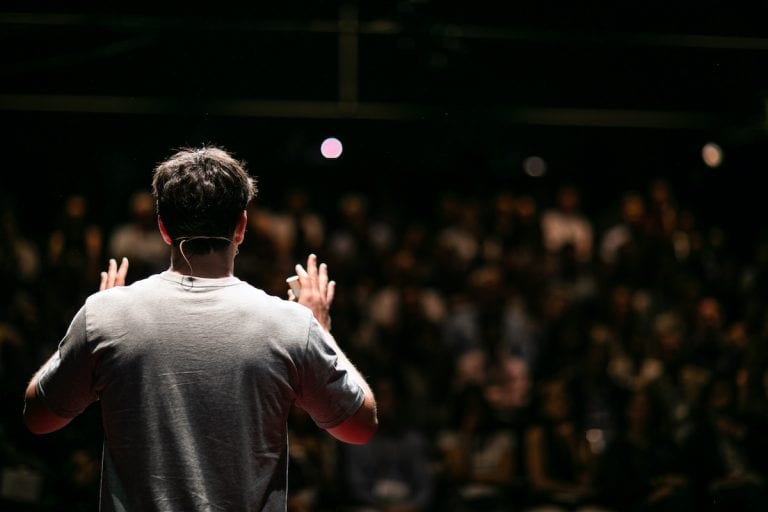Overcome stage fright once and for all! Get rid of performance anxiety with these simple tricks!
Overcoming stage fright and the fear of public speaking, you’ll get a few simple tricks from me in this post. Especially as a presenter and keynote speaker I know stage fright of course and I have developed some recipes against it in the course of time. Because believe me, stage fright can really make your own performance a personal hell.
What is stage fright?
In general, stage fright is the nervousness and stress before a public appearance or before an exam which is often also referred to as performance anxiety or the fear of public speaking. The feelings and symptoms of stage fright you experience come on abruptly are anything but nice and can be very unpleasant. The list of symptoms is long and ranges from violent tingling, sweating, shaky voice, tight throat, hectic spots to sudden heart palpitations. In this article you will learn how to overcome stage fright and to boost your confidence before your next public speaking performance.

Stop guessing how to WOW your audience!
We will send you our secret ingredients to WOW your audience for free! In the MAGIC MOMENTS FORMULA you can learn how to take any audience of any size and create a deep emotional experience for them in order to create a deeper emotional bond with you and your brand.
What happens during stage fright?
But what exactly happens in the body shows symptoms of stage fright. When you’re supposed to go on a stage or you have an exam coming up, your body releases more stress hormones. Your body reactively takes you back to the age when we were unexpectedly attacked by a saber-toothed tiger. The body signals with all available hormones: danger. It now releases excessive amounts of adrenaline, also known as the stress hormone, so you can either pick up your feet and run or face the enemy and fight. Nowadays, saber-toothed tigers are long extinct, but your body still reacts to a perceived danger as it did thousands of years ago.

Why do you have performance anxiety?
As already explained in the previous paragraph, stage fright or the fear of public speaking is a physical reaction to a supposed danger. This danger no longer appears in the form of the aforementioned saber-toothed tiger, but it is sitting in front of the stage smiling at you or giving you the topic of your exam paper. Your body reacts in this situation as it has always done and starts to dope you for your top performance and throws non-stop adrenaline into your bloodstream. You get into stress. That makes it all the more difficult to maintain your stage presence.
Fears as a trigger for your nervousness
The basic triggers for your performance anxiety and the beads of sweat on your forehead are usually fears…
- Fear of not performing and failing,
- Fear of having to be the center of attention in certain situations.
What lies underneath those fears is the question of “what will they think of me?” That again leads one of the deepest fears of all human beings, to
- the fear of not being enough.
And to go even one level deeper, it ultimately leads to the deepest fear of all,
- the fear of not being loved.
If your fears become too overwhelming and you suddenly fall into a kind of shock paralysis, the famous blackout hits you like a bolt of lightning. In this case, however, we are talking less about stage fright, which can also have positive effects, and more about paralyzing speech anxiety.

The desire to overcome performance anxiety
Most of my colleagues and I can confirm it: the term “stage fright” is simply wrong… it should rather be called ‘going to stage’-fright. Once you have made it onto the stage, stage fright is usually gone. On the way to the stage or on the drive to the exam venue – in these minutes our thoughts are dancing cha-cha-cha with us. Partly the voice fails, no matter how much voice training one has already enjoyed and the body also does not do what it should and thus all body language training does not help much at that moment… In all of us there is the longing to overcome this fear of public speaking. Because the actual performance could be so beautiful… if it weren’t for the stage fright beforehand.
Stage fright – what situations are behind it?
Now that we have established that stage fright is basically triggered by fears, let’s take a look at which situations trigger stress and make you feel nervous. And here comes my first tip: keep a “stage fright diary“. Write down all situations in which you notice that you are gripped by stage fright and write down on a scale of 1 to 10 how much performance anxiety and stage fright are bothering you and how you deal with the fear of public speaking in the respective situation.

Situations that are particularly prone to performance anxiety include, for example
- Your performance at a presentation,
- Performances in front of people,
- Exams, where your knowledge is tested,
- Family gatherings where you feel you will not be accepted,
- Events, where you go with a negative feeling and
- The first meeting in a new company.
These are all situations where your self confidence is put to a test as a lot of things could potentially go wrong. To make a mistake is the last thing your brain wants. Especially because your brain is not trained to make you feel great, it is trained to make you survive. What if there is another way where it is OK to make mistakes and with a little bit of practice you learn to relax and be confident? Let’s explore further…
Why the fear of public speaking can be positive and useful
You are probably thinking: how come… I am supposed to give a presentation, a lecture or a keynote and performance anxiety is supposed to be useful? Yes, of course. Because the stress hormone adrenaline also ensures that you are capable of a peak performance. So if you manage to transform the tension on your nerves minutes before your performance into positive energy, then going on stage will not only be easier for you. You will also have the chance to give a really outstanding performance in front of an audience.
Dealing with stage fright – what can you do?
Now it’s time for some advice to do during or before performing alone or in front of another person. Practicing these simple tips will help you relax when you are anxious and develop the skills to perform better, no matter if you give a talk, you are singing or you are the featured main-act of an event.
Relate
Most of the time our subconscious plays a trick on us and threatens us with stage fright. But our subconscious is also easy to outsmart. Tell yourself in the first step: Stay calm, what is in front of you is doable. In stress mode, obstacles look much bigger.
Analyze
Analyze the situation that caused the performance anxiety. With this step it will be easier for you to get the reasons for your nervousness and fear of public speaking out of your subconscious and make them conscious.
Prepare
Prepare thoroughly. Situations that you are familiar with, where you know exactly what is going to happen, give you confidence. And security dissolves your performance anxiety.

Relaxation exercises
Autogenic training and other relaxation methods, such as meditation, help you manage your stress levels when you are nervous. They promote a positive approach to stage fright and help you relax and to reduce your nervousness to a tolerable level.
Mental strategies against performance anxiety
Mental strategies, including affirmations, positive images or thought journeys to the inner source of strength, direct your thoughts positively. This makes you aware of how you deal with your performance anxiety, which in turn can change your attitude towards your fears and even be good for your health.
How do I get my fear of public speaking under control?
This is a question that many people ask themselves when they have to stand in front of other people with a microphone… or rather have to. Did you know that speech anxiety is even more common than the fear of death? With the BRAVO-method you can do something against your speech anxiety.
BRAVO stands for
B= Be Active
R= Relax
A= Affirmations
V= Visualization
O= Offense
Just try it out at your next performance. You’ll see the nervousness give way and your mindset will soon be focused on calm and success.
- Before the performance, get your body moving and get rid of excess adrenaline
- After the movement come to rest, close your eyes and do a relaxation exercise
- Work with positive affirmations ,such as “I inspire my audience”. Use the power of your thoughts and see yourself already there.
- Visualize a successful stage performance with a standing ovation.
- Move to your offense and get out on stage. You are well prepared. Make a conscious decision and don’t give stage fright a chance during your performances.
What to do about stage fright right before your performance?
Immediately before your performance, it is important that you get yourself into the ideal state for your upcoming stage performance. Please remember to drink only moderately half an hour beforehand and ideally not to eat anything, or at most something very light… after all, you don’t want your mouth to still be full of saliva on stage. Basically, try to keep your body as fit as possible.

Get yourself in your best state mentally and emotionally. Prepare carefully and start on time. We often see this with athletes, how they visualize all the procedures before their competition and then build up the appropriate tension before the start. As a speaker, actor or presenter, you need exactly this kind of ritual in the situation before the start. After all, you need to get your voice, hands and other physical prerequisites working at full capacity. When you enter the room practice breathing confidence.
The ideal state before your performance to give stage fright no chance
Immediately before your performance, it is important to get yourself into a peak emotional state. Often stage fright before public appearances arises simply from the fact that you are not well prepared internally (you can find many more presentation tips in my blog post on the subject). With the following three steps, you’ll always be in the right state when it’s time to go on stage.

1. Body
First, it’s important that you’re in good shape physically. This starts with getting enough sleep, eating light before your performance, and drinking enough water. Other points you need to pay attention to:
- Deep breathing into your belly,
- upright posture and power poses,
- activate your body,
- build body tension and
- Smile confidently – this one you can practice every time you see a mirror.
2. Attention (internal vs. external focus)
Stage fright and nervousness usually come from having your attention on yourself. In other words…you’re preoccupied with you instead of your audience. You are getting into your own head and start to imagine all kinds of things that 99% of the time will never become reality. Here it is important that you focus on what you want to convey to your audience instead of just focusing on your inner self. Consciously reimagine, just before you perform, what value your message will add to the people you are about to touch. The moment you think of others, you are no longer caught up with yourself and can therefore not only communicate much better with others, but also the stage fright has no place. Even really great keynote speakers and motivational speakers feel nervous from time to time, but they don’t stay in that state.
3. Words you use in your communication with yourself
It is obvious that it is important for a speaker to find the right words for all situations. However, people often think of this only in terms of giving a talk at public appearances. What is even more important is how you talk with yourself – that is, the words you exchange with yourself. This is true for life and even more so before your performances. Be aware of the words that go through your mind and learn to control them before your performances. Affirmations, said with full emotional intensity, can also help you learn to control your emotions.
What to do about stage fright during your performance?
Usually, the initial nervousness will dissipate as soon as you have begun to speak and stand in front of your audience. Start transforming the energy of stage fright into a positive energy that will carry you during your performance.
- Remember to breathe consciously. Become conscious of your breathing and breathe evenly and calmly. Doing some breathing exercises before you begin will help you calm your nerves immediately.
- Get completely involved with your audience and focus on their needs. Treat them as your friends and they should be the focus of the event. The success of how you perform is deeply connected with the community you build with every person in the room.
- Always remember, your audience wants you to win. Once again… they are your friends. You have to love them. What you send out is what your audience sends back to you.
- Find anchor points in the room. These can be people you know who have come to the event especially for you and who you know are sympathetic to you or someone you have connected to before you started.
- Put a talisman on the stage so you can see it. This will give you strength and your trembling will stop by itself. Give it a smile every time you see it.
- And lastly, focus on the positive and if you ever get out of step, just focus on your goal that you want to achieve with your talk.

Ask Ronny to coach you for your next performance
Click on the button and send a non-binding request to Ronny to be your coach for your next keynote, speech or presentation.
How can I learn to speak in front of many people?
In conclusion, stage fright and nervousness before public appearances are quite common. It is important to know how to deal with it when you suddenly feel physical reactions.

If you are presenting via video conference or webinar, be sure to familiarize yourself with the technology beforehand. Otherwise, your stage fright is pre-programmed. A good emcee for your virtual event can also help you.
If you need further help to get a grip on your nervousness as an actor or speaker, feel free to write me a message! Also, feel free to comment on how you deal with stage fright.
I look forward to reading from you,
Ronny









 Contact
Contact








Very interesting and informative.